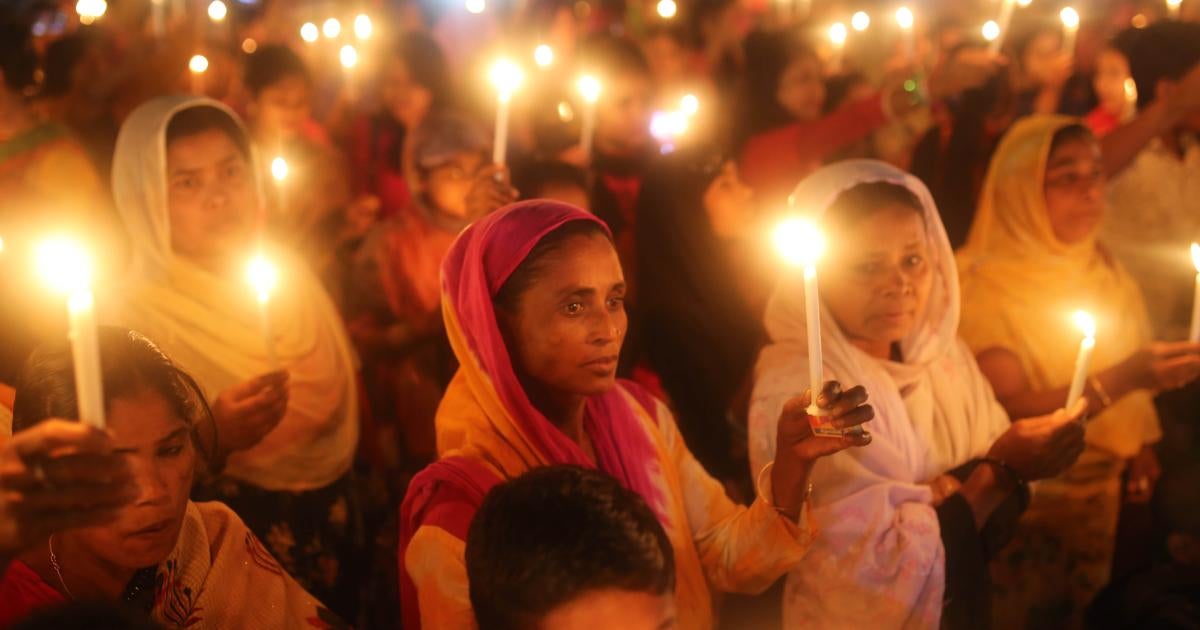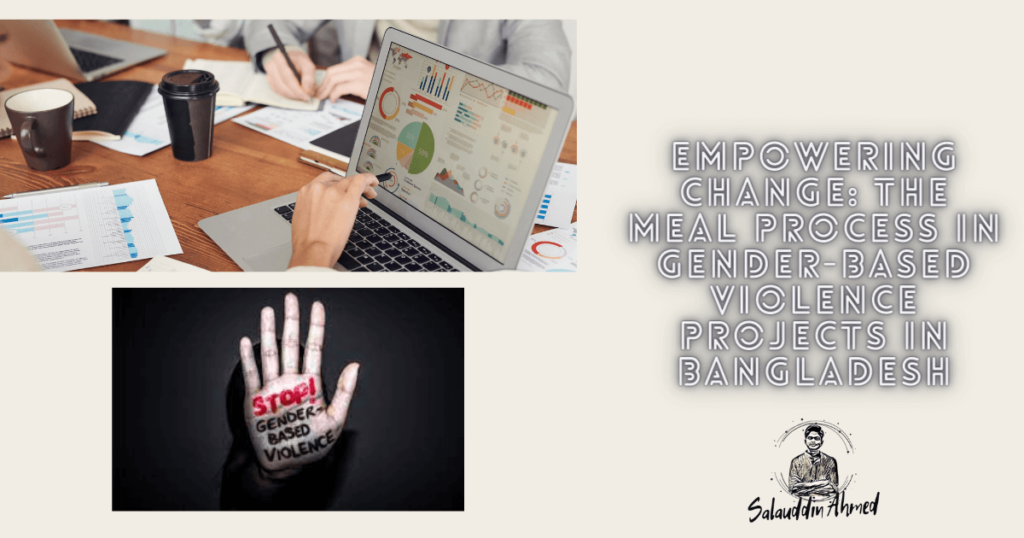Gender-based violence (GBV) remains a pressing issue worldwide, with women and girls disproportionately affected by various forms of abuse and discrimination.
In Bangladesh, the fight against GBV is a critical priority, requiring effective interventions that address root causes, protect survivors, and promote gender equality.
To ensure the success and impact of GBV projects, a robust Monitoring, Evaluation, Accountability, and Learning (MEAL) process is essential.
In this blog, we will explore the significance of MEAL in GBV projects in Bangladesh and illustrate its transformative power through a real-life incident.
Importance of MEAL in GBV Projects
A GBV project needs the overall MEAL procedure specifically in every subbranch of the project. Let’s dive in-depth.
Monitoring
Monitoring is crucial in GBV projects to ensure that interventions are implemented as planned and that the safety and well-being of survivors are prioritized.
Regular monitoring enables project teams to track the provision of services, assess the effectiveness of awareness campaigns, and identify any gaps or emerging challenges.
It allows for timely adjustments and improvements to deliver impactful and responsive interventions.
Evaluation
Evaluation provides an opportunity to measure the outcomes and impact of GBV projects. It helps determine the effectiveness of strategies, identify best practices, and understand the changes experienced by survivors and communities.
Evaluation findings can inform future programming, contribute to evidence-based policymaking, and drive systemic change in addressing GBV in Bangladesh.
Accountability
Accountability is a fundamental aspect of any GBV project. MEAL processes promote transparency and ensure that project implementers are held responsible for their actions and decisions.
Establishing accountability mechanisms, such as feedback systems and complaint mechanisms, allows survivors and communities to voice their concerns and hold project stakeholders accountable for addressing them effectively.
Learning
Learning is at the core of the MEAL process. GBV projects in Bangladesh can benefit greatly from learning from successes, failures, and emerging lessons.
By documenting and sharing knowledge and experiences, project teams can enhance their understanding of effective strategies, strengthen partnerships, and continually improve interventions.
Learning fosters innovation encourages adaptive management, and promotes sustainable change in combating GBV.
Strengthening Survivor Support in Hathazari, Bangladesh

Imagine a GBV project in Hathazari, Bangladesh focused on providing comprehensive support and empowerment to survivors of domestic violence.
Monitoring
The project team conducted regular visits to shelters and support centers, ensuring that survivors’ needs were met and that services were provided according to established standards. Monitoring data included the number of survivors assisted, types of services accessed (e.g., counseling, legal support, vocational training), and follow-up support provided.
The data revealed challenges in reaching rural areas, the limited capacity of service providers, and the need for more specialized care for marginalized groups, such as ethnic minorities and women with disabilities.
Evaluation
An evaluation was conducted to assess the project’s impact on survivors’ lives and the effectiveness of various interventions. The evaluation employed mixed methods, including surveys, focus group discussions, and in-depth interviews with survivors, service providers, and community leaders.
The findings highlighted positive changes in survivors’ self-esteem, economic empowerment, and increased awareness of their rights. However, it also emphasized the importance of engaging men and boys in prevention efforts, strengthening referral mechanisms, and addressing cultural norms perpetuating violence.
Accountability
To ensure accountability, the project established a survivor feedback mechanism, ensuring that survivors could voice their concerns and provide input on services and support.
The project team responded promptly to feedback and complaints, taking corrective actions and improving service delivery.
Regular meetings with community leaders, government officials, and stakeholders were held to foster transparency, enhance coordination, and address systemic challenges in combating GBV.
Learning
The project team organized learning workshops, knowledge-sharing sessions, and capacity-building training for service providers and community members. Lessons learned and best practices were documented and disseminated widely to promote cross-learning and replication.
The project team utilized this knowledge to refine interventions, strengthen partnerships with local organizations, and advocate for policy changes to address GBV more effectively in Bangladesh.
You may also read:
Learning from Failure: The Path to Greatness
Unleashing the Rich-Minded Potential
What is the purpose of monitoring a project?
What is the difference between monitoring and evaluation?
Monitoring: Monitoring is an ongoing and systematic process of collecting and analyzing data to track the progress of project activities and outputs. It focuses on the implementation of the project, ensuring that it is proceeding as planned and identifying any deviations or challenges.
Evaluation: Evaluation, on the other hand, is a periodic and comprehensive assessment of the project’s outcomes, impact, and overall effectiveness. It examines the results achieved, the relevance of interventions, and the sustainability of the project. Evaluation provides insights into what worked well, what could be improved, and what changes have been observed as a result of the project.
In summary, monitoring is an ongoing process that tracks progress, while evaluation is a more comprehensive assessment that looks at the overall impact and effectiveness of the project.
Why is accountability important in project implementation?
Transparency: Accountability promotes transparency by ensuring that project activities, decisions, and resource allocations are conducted in a clear and open manner. It allows stakeholders to understand how and why certain decisions were made and how resources are being used.
Trust: Accountability builds trust among project stakeholders, including beneficiaries, donors, partners, and the wider community. When project implementers are held accountable for their actions, it enhances confidence in the project and its ability to deliver on its promises.
Quality Assurance: Accountability mechanisms help maintain the quality and standards of project implementation. By establishing checks and balances, accountability ensures that project activities adhere to established guidelines, best practices, and ethical standards.
Learning and Improvement: Accountability allows for learning from mistakes and making necessary improvements. When project implementers are accountable for their actions, it creates a feedback loop that enables the identification of weaknesses, lessons learned, and opportunities for growth and innovation.
Overall, accountability ensures responsible and transparent project implementation, fosters trust, and contributes to the overall effectiveness and success of the project.
How does the learning component of the MEAL process benefit projects?
Continuous Improvement: Learning from experiences, both successes and failures, helps project teams identify areas for improvement. By reflecting on lessons learned, projects can adapt strategies, refine interventions, and make necessary adjustments to achieve better results.
Evidence-Based Decision Making: Learning through the MEAL process generates evidence that informs decision-making. By analyzing data and drawing conclusions, project managers and stakeholders can make informed choices about resource allocation, policy changes, and future project directions.
Innovation and Creativity: Learning encourages innovative thinking and creative problem-solving. By exploring different approaches and solutions, projects can challenge conventional practices and find more effective ways to address complex issues.
Knowledge Sharing: The learning component facilitates knowledge sharing among project staff, partners, and stakeholders. By documenting and disseminating lessons learned, best practices, and success stories, projects can contribute to the wider knowledge base, promote cross-learning, and inspire others to replicate effective approaches.
In summary, the learning component of the MEAL process enables projects to continuously improve, make evidence-based decisions, foster innovation, and contribute to knowledge sharing within the development community.
Conclusion
The MEAL process is instrumental in strengthening GBV projects in Bangladesh, enabling project implementers to monitor progress, evaluate impact, ensure accountability, and foster learning.
By sharing a real-life incident focused on survivor support, we have witnessed the transformative power of MEAL in empowering survivors and driving positive change.
Through continued commitment to monitoring, evaluation, accountability, and learning, GBV projects in Bangladesh can contribute to a society free from violence, where women and girls can thrive and realize their full potential.

